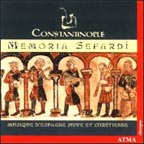Constantinople / Memoria Sefardí: Musique d'Espagne juive et chrétienne
review by Judith Cohen

Constantinople
Memoria Sefardí: Musique d'Espagne juive et chrétienne
ATMA ACD2 2274, 2001
www.rockian.biz/atma/at2274.htm
Just about every group that performs Sephardic music these days seems to feel the need to justify an almost inevitable non-authenticity by lofty statements about the impossibility of an authenticity usually dismissed as undesireable in any case. Of course, they could simply learn to perform in traditional Sephardic style, but for Early Music groups who for various reasons insist on presenting non-medieval music as medieval, this involves some metaphysical-ish discourse rationalizing their presentation. Or, of course, they could always just say "we feel like doing it this way and we like it." That said, once one wends one's way through all the rather pompous rhetoric, this is, like so many recordings of Sephardic music, very good music indeed—it's just not very Sephardic music.
To begin with, this is an instrumental recording and the essence of Sephardic music is vocal. There are some impressive percussion solos, albeit in a style which has nothing whatsoever to do with Sephardic music and a lot to do with Artistic Director KiyaTabassian's Iranian origins. Iranian, too, is the setar, whose use here we are informed is "ground-breaking"—actually, come to think of it, Rob Simms plays setar on our old Dans mon chemin recording, but we didn't think of it as ground-breaking, just musically agreeable. Had we thought to label it as ground-breaking, who knows, well, what ground might have been broken?
Saying that these "ancient songs" have "come down to us in manuscripts" is extremely misleading: there are no "ancient" manuscripts of Sephardic music. The well-known tune of "La rosa enflorece" is for unexplained reasons identified as being "from Spain", instead of from Greece. A truly annoying clanging bell or cymbal is arbitrarily introduced into the lovely tune of "La vida es un pasaje" (oddly spelled). There are other curious spelling mistakes, such as "Rabbiner" for "Rabino", or, in French, "rabbin" in the titles. The group does not bother providing any information whatsoever about the songs—no sources, no resumes of the (unsung) lyrics, no suggestion of where they're sung. For a recording entitled "Memoria Sefardí", they seem to do a pretty good job of effacing memory or memory aids. It is even more puzzling that they ignore the song texts completely in both performance and notes, given that the liner notes go on about the importance of thought "as the knowledge of the language and of the text" leading to "an analysis of the scientific, philosophical, social, and historic aspects of the music." Having established this, they say no more about the texts, if indeed they ever knew them.
Three Renaissance Spanish pieces from the Cancionero Musical del Palacio are included, presumably as a kind of imaginary background for Sephardic pieces, most of whose tunes were composed long afterwards. The overall heavily serious, "more spiritual than thou" atmosphere of the CD is annoying—to me—but is, after all, almost de rigueur among performers of Sephardic music who come from Early Music or later WAM (Western Art Music) backgrounds.
On the ATMA sampler CD Constantinople which includes selections from other CDs of Sephardic, Renaissance and medieval pieces, two Sephardic songs are actually sung, and quite beautifully, by Françoise Atlan. The other Sephardic selections on this CD are performed instrumentally, with the addition of the typical cavalier—and inaccurate—labelling of everything Sephardic as a "romance". Of the five Judeo-Spanish selections here, only two are in fact romances (narrative ballads); the others are "kantikas", including one wedding song.
I haven't met Kiya Tabassian, the director and setar player, or his virtuoso percussionist brother Ziya, though we've exchanged a couple of emails, and don't know winds player Matthew Jennejohn, but strings specialists Isabelle Marchand and Guy Ross were part of my grad school days at the Université de Montréal and it's nice to hear them again on this recording. My comments are not intended to in any way disparage the musicians, who are, without exception, excellent; and the music—again—is aesthetically very pleasing if Sephardically—well, sort of absent.
Sent to the KlezmerShack by Judith Cohen on 10-Feb-2006. Email Judith Cohen
to About the Jewish-music mailing list
to The Klezmer Shack main page
to Ari Davidow's home page
Thank you for visiting: http://www.klezmershack.com/articles/cohen_j/constantinople/index.html
Copyright © 2006 Judith R. Cohen. All rights reserved. Used with Permission.
This page is maintained by Ari Davidow. Send me E-mail with any comments or suggestions. All rights reserved. Last revised
15 April, 2006.

